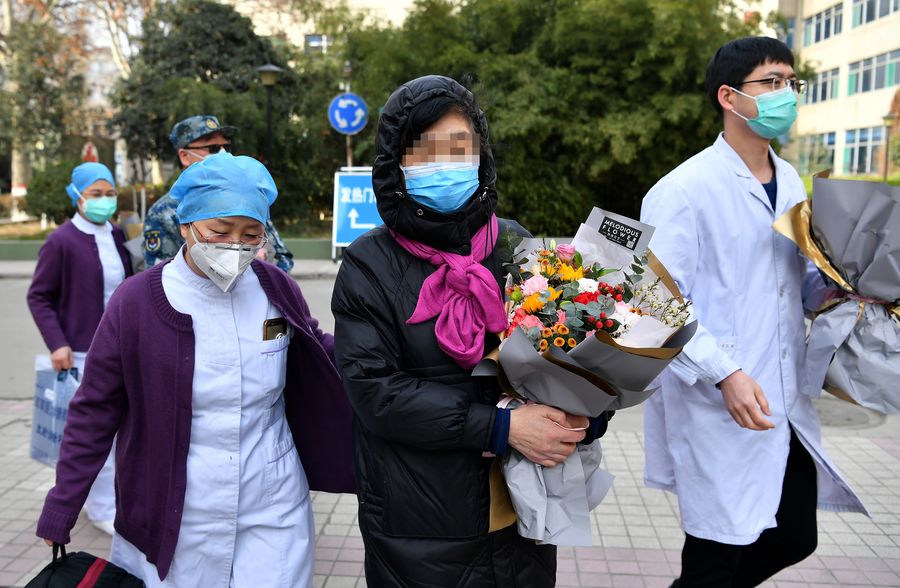
A cured COVID-19 patient (C) is discharged from the hospital in Xi'an, northwest China's Shaanxi Province, Feb. 15, 2020. The patient was the first cured patient who was once in critical condition in Shaanxi Province. (Xinhua/Liu Xiao)
China have called for plasma donation from cured patients who were infected with novel coronavirus as initial results have indicated the effectiveness of treatment using their plasma.
WUHAN, Feb. 15 (Xinhua) -- Chinese experts have called upon cured patients who were infected with novel coronavirus (COVID-19) to donate plasma at hospitals as neutralizing antibodies have been identified in the plasma of some patients.
Initial results have indicated the effectiveness of convalescent plasma-derived therapeutic products in curing infected patients in severe and critical conditions, said Zhang Dingyu at a Thursday press conference, as head of Wuhan Jinyintan Hospital, a major designated hospital to admit confirmed cases in Wuhan, the epidemic center of COVID-19.
Zhang said that based on the clinical-pathological process, most of the cured patients will produce specific antibodies against the virus in their bodies, which can help kill the virus.
Four critically ill patients in Wuhan Jinyintan Hospital have received convalescent plasma treatment and all of the patients have shown improved clinical symptoms about 12 to 24 hours after they received the treatment, Zhang added.
After Zhang's nationwide appeal of plasma donation, Shanghai on Saturday urged recovered coronavirus patients to donate plasma, and designated hospitals began to adopt convalescent plasma therapy to treat critically ill patients.
"Designated hospitals in Shanghai welcome recovered patients who have been discharged from hospitals to donate plasma for the treatment of other infected patients in the coming weeks," said Lu Hongzhou, a member of the city's medical experts group on the treatment of COVID-19.
Official data showed 124 patients in Shanghai have recovered from COVID-19 and discharged from hospitals by Saturday afternoon, of whom 14 have shown willingness to donate their plasma to assist coronavirus research and treatment.
Some recovered patients regard the donation as a way to pay back to the society after they received timely and effective treatment.
"Before discharged from the hospital, I learned from the nurses that I can donate plasma, which I think is very helpful," said a recovered patient surnamed Liu who is willing to become a donor.
"We were helped by others and we want to help other patients as well," Liu said.
Meanwhile, Zhang also reminded the public not to have too high expectation on the convalescent plasma-derived therapeutic products as the treatment only helps relieve the symptoms to give doctors a shot and the recovery mostly relies on patients' natural immunities. ■



